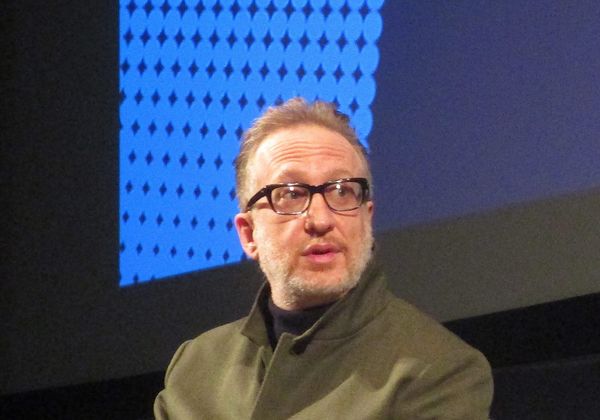James Gray’s Armageddon Time, starring Anthony Hopkins, Banks Repeta, Anne Hathaway, Jeremy Strong, and Jaylin Webb was the Main Slate special 60th anniversary screening event at the New York Film Festival. Gray gives thanks to Cate Blanchett (who stars in Todd Field’s Main Slate highlight TÁR with Nina Hoss and Sophie Kauer) and Robert De Niro and a very special thanks to his longtime editor John Axelrad (Ad Astra, The Lost City Of Z, The Immigrant, Two Lovers, We Own The Night) in the end credits.
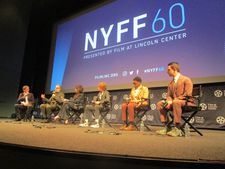 |
| Dennis Lim with James Gray and Armageddon Time stars Anne Hathaway, Banks Repeta, Jaylin Webb and Jeremy Strong Photo: Anne-Katrin Titze |
In Armageddon Time, James Gray revisits ghosts of his childhood in 1980 Queens, NY. Central is the remarkable grandfather (Anthony Hopkins) who protects Gray’s young alter ego, Paul Graff (Banks Repeta), with his love and grace, explains to the active child what a conscience is and helps him become a real boy who can keep his own mischievousness in check, at least sometimes.
Johnny (Jaylin Webb), Paul’s best friend lives under far more dire circumstances than he does, and when Paul switches to a private school, their friendship and Paul’s core goodness are being tested. At the new school he also has a brief, spooky encounter with Fred Trump (John Diehl) and listens to a shifty speech by Maryanne Trump (Jessica Chastain) about hard work and earning what you’ve got.
Paul’s exhausted mother Esther (Anne Hathaway) and overwhelmed father Irving (Jeremy Strong) actually do what they can under not so easy circumstances. During a pivotal moment near the immensely photogenic Observation Towers, the crown jewels of the New York State Exhibit at the World’s Fair of 1964/65, grandpa and Paul launch a little home-built rocket into space and nothing has been the same ever since.
At the Armageddon Time press conference, moderated by the New York Film Festival Artistic Director Dennis Lim, James Gray spoke about the many autobiographical aspects of his latest film.
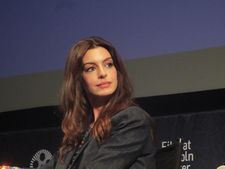 |
| Anne Hathaway Photo: Anne-Katrin Titze |
Anne-Katrin Titze: I have a follow-up question on the comment you made about the grandfather [that he doesn’t consider him a saint] we just saw on screen. He might not be a saint, but he is very much Jiminy Cricket, the conscience hovering. The performance is tremendous so I was wondering if there was anything new about your grandfather that you found out by watching Anthony Hopkins.
James Gray: Jiminy Cricket, my god! He is very … look, I hate to use the word accurate, it doesn’t have any real meaning, nor do we care about it. Accuracy is overrated. But I can tell you that I don’t blame my parents because of the amount of daily struggle. It’s hard for people who aren’t 1000 years old to remember the mid-to late 1970s. At least in my memory, 1977 in particular, my parents were financially devastated. I remember that there was the blackout and all these other things - “the Bronx is burning” - all of that time period, which in some terms I refer to more than, as we call it, “the Eighties.”
I remember my parents had such stress about making ends meet and didn’t really spend any time with my brother and me. Now I don’t blame them because it felt existential. I remember that very clearly. I remember my mother talking [he changes his voice]: “Irving, we got to get the food stamps.” That was like a big deal in the house that we were going to use food stamps.
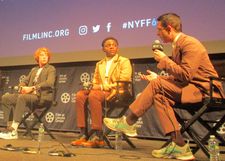 |
| Banks Repeta, Jaylin Webb and Jeremy Strong Photo: Anne-Katrin Titze |
And I remember that my grandfather was the person who said “You are wanted! I love you, you are wanted!” And you really only need one person in your life to tell you that growing up. And you’ll be okay. It doesn’t mean it’s okay to have crappy parents. What I’m saying is that as long as there is one person close to you who makes you feel that way you can survive. He was that person for me. And I told that to Tony [Hopkins] and Tony was sort of like [Gray impersonating Hopkins perfectly]:” Ah, right, right. Any other words? I need the words?” I said “You’re giving the boy a benediction.” [in Hopkins whisper voice]: “Oh benediction, very good, very good.” And then he went off and did his thing. Take to take, you only have to give him two to three words to change the emotional temperature a tiny bit. He’s so good.
The only thing I can tell you about what I learned is that thing, the importance that he had in my life that he told me; “You’re going to be okay, kid. It’s going to be okay.” Because I felt such a level of panic and angst. And I’m telling you this and I’m not asking for, by the way, pity, I’m just explaining the state of things and how I perceived them at that moment.
And I was, as I have said to you [in response to Dennis Lim], many times also a jerk, which I wanted to put in the film as well. “Dumplings, suckers!” I mean my mother had made this whole meal and I was going to be a shit-head and order dumplings. So it wasn’t all… like he would put me back in my place. “You be a mensch!” he’d say that to me, “you be a mensch.” Okay, then for two days I’d behave and then I’d become a jerk again, you know, a cycle. I don’t know if I answered the question.
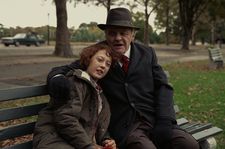 |
| Paul Graff (Banks Repeta) with his grandfather (Anthony Hopkins) |
He definitely did and for the next question spots a familiar figure in a black hat, sitting in the last row of the Walter Reade Theater.
JG: That’s the great Ed Lachman back there! How are you Ed? You’re a great artist!
Ed Lachman: You did a great job with Darius [Khondji]. Could you say something about the visual world you created that isn’t necessarily the Eighties, which I loved about the film, as you created your own world? Could you say something about your interpretation of what the imagery was to create that world for you?
JG: Yes and hallo! Darius and I tried to watch no movies.
Anne Hathaway [jokingly remarks]: I haven’t seen that one. I’m so sorry, I’m so sorry.
JG: We tried to watch nothing at all and the camera operator, I remember at one point - who was a terrific camera operator, Julian Delacruz, he said “I’ve never seen 400 Blows.” And I remember Darius was like [now in the breathy voice of his DoP]:”Nooo, you’ve never seen 400 Blows, noooo!” And I said “Darius, it’s okay, he’ll watch it after we’re done. We don’t want him to, we’ll rip it off anyway unconsciously. Let’s not rip it off.”
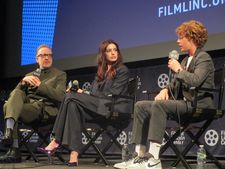 |
| James Gray with Anne Hathaway and Banks Repeta |
So I took them to the museum. We went to The Met and we just looked at different works of art and started to talk about common things. I kept saying to them over and over again and I winded up writing the words on the camera on a piece of cardboard. This is what you need to know visually: Warmth, Humour, Love, Loss. Those were the four words. And I said, I want you to think of it as a ghost story, where the actors are almost never in their key light.
Darius took a lot of inspiration from a very famous painting by Vermeer at the Met that he saw. Which is a woman in the kitchen, sort of like this [he leans his head in his hand], but she’s not in the light, she’s sort of a bit withdrawn. And I think he took that from me telling him about the energy crisis of ’79 and how my father was always like [now in father’s voice]: “If you’re not in the room, turn off the light, turn off the light!” So I always felt like my house was really dark and lit from another space.
For example when Banks comes home and he sees Annie on the couch, the scene is lit from another room. She’s not in her key light, so to speak. Even the dining room scene with the dumpling stuff, I think it was two stops underexposed, the overhead light is very dim. I thought of [in father’s voice]: “I have a new dimmer put in. I put in on the dimmer.” All that kind of thing led to weirdly a visual strategy for the film. The idea was to make it almost like a ghost story.
 |
| New York State Exhibit at the World’s Fair of 1964/65 postcard, collection Ed Bahlman Photo: Anne-Katrin Titze |
I made fun of you about the Proust thing [to Jeremy Strong who earlier revealed that they discussed Proust’s Remembrance Of Things Past in preparation]. It was a cheap laugh I was trying to get. But the point was, it is true when I went back to the house, when I brought my kids back that moment, the fact that there was so little evidence that my grandfather was alive and my mother and all those people that are now gone.
The dinners that seemed so vital and so important and now it’s like they are dancing around like fireflies in my memory and that’s about it. For me that’d such a melancholic power and I started showing Darius polaroids. I said to him, and I quoted from it many times, it’s so brilliant - that Susan Sontag [see Andrew Bolton on Camp: Notes On Fashion] thing On Photography, where she talks about the minute the photograph is taken, it’s instantly in the realm of the irretrievable past and so takes on a melancholy. And I see people all the time always taking pictures. That’s why people have photo albums and you never look at them. Because it’s like you want to keep that moment, preserve it forever. But to look at it unconsciously you realise you ain’t going to get it back.
What I tried to communicate with Darius and we didn’t wind up speaking much during the shooting, except about lenses really. But with the light and the look was kind of this idea that it was a ghost story. We looked at some Saul Leiter colour photography from the early Fifties, we did look at late Seventies photography, dye-transfer kind of thing, but it was frustrating for us.
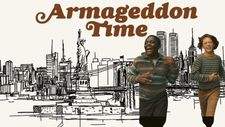 |
| Armageddon Time |
I wanted to shoot on film, it’s the first time I didn’t, for a variety of reasons. Not least is that the stocks no longer respond the way that they used to. It’s not there anymore; it’s almost like you said to a painter, “yeah that lamp black you use, I’m going to take away the tube and you can’t use it anymore.” For us, and I know you know this, it’s very frustrating. I would love to go back and manufacture old stocks but they can’t do it anymore. All of this went into the soup. I don’t know if this answers your question but all of this was part of the conception.
EL: Oh, very good. Actually, you rented my lenses, used the Baltars.
JG: The Baltars?
EL: Darius rehoused a set of Baltars from 70 years ago. Those lenses you were using. Thank you.
JG: Thank you!
Armageddon Time opens in cinemas in the US on November 4 and in the UK on November 18.
Laura Poitras’s All The Beauty And The Bloodshed on the life and career of Nan Goldin was the Centerpiece selection of the 60th New York Film Festival. Noah Baumbach’s adaptation of Don DeLillo’s novel White Noise, starring Adam Driver and Greta Gerwig, opened the festival and Elegance Bratton’s The Inspection, starring Jeremy Pope with Bokeem Woodbine, Raúl Castillo, and Gabrielle Union was the Closing Night.








